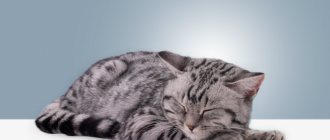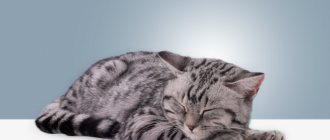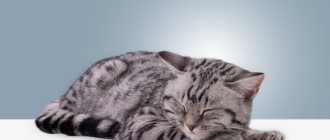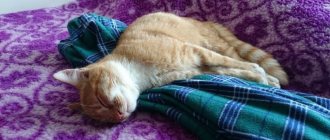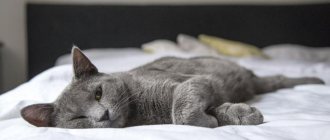We all love it when cats snuggle up with us at night, especially when they come to us on their own.
Not all cats like to sleep next to or on their owner, but many are comfortable sleeping at the foot of the bed or on their owner's feet. But why does this happen?
Like many other things in cat behavior, this can be explained by primitive instincts. There are several reasons for this, and some may surprise you.
Whether your cat sleeps at your head or at your feet, know that she must love you very much to sleep comfortably next to you. And even if this is the case, don't be surprised if your cat doesn't spend every night with you.
For example, our cat Bo comes to us every other time, but Calista spends every night with us. Previously, on the contrary, Bo slept with us, but Calista did not.
Let's protect each other!
Cats like to stay in packs and are anxious about their surroundings. This is one of the reasons why cats butt, rub against you, or trample on you with their paws.
Your cat may sleep at your feet so it can quickly contact you in case of a threat. Cats are light sleepers and will wake you up to either protect you or at least warn you of danger.
You may also notice that some cats prefer to sleep under a blanket, seeking warmth and protection if they are scared.
Why do cats sleep so much?
There is no consensus on the reason why cats sleep so much, although most studies are nurturing in this regard. These studies show that cats have the luxury, even in nature, of sleep. The reason for this is that they are good hunters and therefore do not need to spend as much time hunting as other animals.
In addition, in winter, cats prefer to rest longer to retain as much heat as possible. This also explains why cats seek out the warmest places to rest. And it is quite clear that this dormant custom, or instinct, was preserved by domestic cats.
Another reason why a cat sleeps so much is because they are bored or spend too much time alone during the day. If you are not home, it is normal for your cat to sleep. And when you get home, this lethargic manner may continue.
If your cat is lazy or sleepy, consider playing with her more, offering her toys and spending more time with your cat. But don't interrupt your cat's sleep time, as this can cause stress.
Many people believe that cats are exclusively nocturnal animals and therefore sleep during the day, but this is not true. Cats sleep at night too!
I don't want to be pinned down!
Have you ever slept with someone who tosses and turns in their sleep? Do you know what it’s like when someone leans on you with their whole body?
And if this is unpleasant for you, imagine what it will be like for the cat in this case.
Cats realize that they are much smaller than us, so they try to stay away from their centers of gravity (torso or stomach). So, if we start tossing and turning, there is a higher chance that they will wake up and run away.
Fussing in their sleep is the main reason why cats prefer to sleep near their owner's head.
How many hours a day does a cat sleep?
If you're jealous of your cat for the number of hours he spends sleeping each day, don't worry, you're not the only one! Whether your cat sleeps in your head, on your chair, in the sun, on your computer, or in the strangest and most unlikely places, know that cats are comfortable everywhere!
Although it seems incredible, a cat's body needs everything in order to stay healthy. Are you wondering why cats sleep so much? If yes, don't miss reading this article where we will discuss how many hours does a cat sleep per day.
You are my alarm clock; I will follow your regimen
Have you ever noticed that when feeding time approaches, your cat goes to the kitchen and waits?
Our cats are the same! And they eat four times a day.
There is no way to skip a meal, because Calista begins to bite her leg, and Beau sits proudly in a chair, as if this is his rightful place.
Cats may be comfortable sleeping with you because it helps them establish a more structured schedule. Cats sleep most of the day and appreciate time when they can rest next to their owner.
And this brings us back to the first point - cats sleep more peacefully next to their owner. Cats begin to consider certain hours of the night/morning extremely safe for sound, restful sleep.
But be prepared for an unceremonious awakening if your cat wakes up before you and it’s time for breakfast.
How many hours a day do adult cats sleep?
After the fifth week and until the cat's first year of life, as we said earlier, kittens sleep only 65% of the time. However, once a cat reaches adulthood, the average number of hours a cat sleeps increases again.
This sleep time for cats increases to approximately 70% and 75%, that is, 15 or 16 hours a day. Typically, it takes one year before the cat reaches adulthood. This time, however, depends on the cat's breed, as some breeds will take longer to reach adulthood.
Despite these long periods of rest, an adult cat does not sleep for 16 hours straight. These 16 hours of sleep are usually broken up by cat naps throughout the day. During this sleep, you will notice that your cat wakes up quite easily.
In fact, a cat falls into deep sleep once or twice a day. You've probably also noticed that cats can fall asleep anywhere!
You are my favorite!
I don't want you to quarrel with other family members over who the cat likes more, but they usually sleep with those who are closer to them.
In our case, cats simply often settle down with someone who has already gone to bed, and I go to bed later than my partner, so that person is me!
Cats are territorial animals and need to know what is going on at all times.
Photo: vetexplainspets.com
This thirst for knowledge makes kittens so curious. They deliberately bump into objects or place their paws anywhere, marking their favorite places. This is how cats mark places as safe.
A familiar scent is another reason why cats like to sleep on their owners, and they also mark you.
This does not mean that the cat is friends with only one family member. Cats understand that there can be more than one person in a family and will be affectionate with different family members if they feel they are safe.
So cats often sleep with different people, seek attention from everyone in turn, but can still give preference to one person.
Cat survival
An adult rarely weighs less than 40 kg. Assuming the average weight of an adult cat is 3 to 4 kg - excluding Maine Coons, Savannah cats and other larger breeds - this means that cats are choosing to sleep with a person who weighs at least 10 to 13 times more than them.
So if a cat is intelligent and keen to survive without being turned over in the middle of the night, it will naturally choose to sleep in a safer place: its feet. There is less weight, and the chances of escape are easier and greater.
In fact, cats develop the habit of moving towards either end of the body (head or legs) when they become adults, while in general kittens sleep on the chest of their preferred and sleeping owner.
Kittens love to sleep on their owner's chest as they can feel the heartbeat and in turn feel protected, which reminds them of their mother and lactation.
However, once cats learn that humans move and roll in their sleep, they learn and adapt. This explains one of the main reasons why your cat loves to sleep with you.
But my cat used to sleep on my chest, but now he’s stopped...why?
Even though Beau is our oldest cat, he still loves to sleep on our chest.
This behavior comes from childhood; it is calmer for a kitten to hear someone else’s heartbeat. Kittens often sleep very close to their mother, especially while she is still nursing, and sleeping next to you reminds them of this.
Some cats prefer to sleep next to their siblings, especially as the bond between them grows stronger. If you've ever found yourself in a situation where your first cat stopped sleeping next to you and instead preferred a sibling, you can breathe a sigh of relief. This usually means your cats are getting along.
If the kitten doesn’t like the owner’s fussing, he can also move to the legs.
It doesn't matter how the cat sleeps, as long as he loves you.
How many hours does an old cat sleep?
A cat's old age is calculated slightly differently depending on the cat's breed. Although, as a general rule, when a cat is over twelve years old, most are considered senior cats. When they reach old age, it may be difficult to notice any changes since they do not change physically.
But gradually, you may notice a change in your old cat's behavior. Older cats become more sedentary and calm. Changes in appearance in cats only occur when they are around 15-18 years old or if your older cat is sick.
As cats age, their activity levels decrease, and older cats tend to sleep more hours. An older cat will sleep approximately 80% to 90% of his day, which is 18 and 20 hours. This is very similar to the number of hours a kitten sleeps.
Why do cats like to sleep on humans?
For all the millennia that cats have lived next to people, the human race has never learned to understand these mysterious creatures. Therefore, it is impossible to say exactly why they prefer to sleep on their owners, choosing different parts of their bodies (head, legs, stomach, chest, etc.). Only the cats themselves know this, but, alas, they cannot tell about it and we can only speculate.
Cats love to sleep on their owners.
Since ancient times, cats have been credited with psychic qualities and the ability to heal people. It is believed that the cat lies down exactly where it hurts (or doesn’t hurt yet, but will get sick in the near future). Allegedly, having its own powerful energy, the pet senses an area with a changed energy field and, by moving there, neutralizes its negative impact, and also relieves pain.
When an animal stubbornly tries to lie down on its legs, this may indicate some problems in the limbs with joints (arthritis, arthrosis) or veins (varicose veins). If nothing bothers the owner in this area for now, then the little healer will work for the future and relieve joint tension, as well as fatigue accumulated over a long day of work.
Many cats like to sleep on their feet
However, most often, furry healers sit comfortably on a person’s stomach, which is easily explained by the presence of a large number of internal organs in this part of the human body. Felines are distinguished by their ability to sensitively respond to the psychological state of household members. Having settled down in the solar plexus area, the cat will help improve your mood, relieve tension and stress, and also relieve the blues and depression.
A good friend of mine who suffers from heart failure always places his cat on the left side of his chest. At first he stomps around a little, then he carefully lies down, curled up into a ball. The man claims that this brings noticeable relief.
A cat systematically trying to lie on its owner's head thus relieves his mental stress. Experienced cat owners say that these animals are extremely sensitive to changes in atmospheric pressure. They are trying to help weather-dependent people, alleviate their condition caused by cerebral vasospasm, and relieve migraines. At the same time, they can hug the host’s skull with their entire body.
Some cats prefer to lie next to a person’s face and even on top of a person’s head.
Reasons for behavior
Cats have been living next to people for a very long time, but despite this, humans have not yet been able to fully study the behavioral characteristics of these domestic animals. Moreover, each pet has its own individual character. Therefore, for many, cats still remain mysterious animals, and it can be difficult to understand why cats do certain things.
Cats very quickly get used to their owners and each pet has a special place in the house where he likes to relax. For example, many cats love to sleep at their owner's feet. It is impossible to answer correctly the question of what are the reasons for this behavior. But there are several versions that explain this behavior of cats.
Veterinarians' opinion
Since cats love warmth and prefer comfortable and cozy conditions when sleeping, they always choose the warmest place in the house. In the cold season, this is a place next to the radiator, sofa or bed of the owner. That is why, in order to rest in comfortable conditions, many cats sleep at human feet.
Veterinarians explain this love for warmth by the fact that during sleep the cat does not move and begins to freeze a little. To prevent hypothermia of its body, the animal initially looks for a warm and safe place.
Cats love to sleep warm
Opinion of bioenergetics
There is a theory that cats are able not only to sense negative energy, but also to neutralize it. According to this theory, cats can easily find accumulations of negative energy in the house. This is the place that animals choose to rest and sleep. Once a cat lies down for a while in such a place, the negative energy is neutralized and no longer poses any danger. However, this does not cause any harm to the pet.
Often negative energy accumulates in the corners of the room. But it often happens that a cat lies down on the very chair or armchair where a person was recently sitting, and at night they prefer to sleep at his feet. This suggests that the pet feels the person’s energy and is trying to help him, neutralize all the negativity. Many bioenergetics specialists are confident that a person’s negative energy accumulates in the lower part of his body.
There is another version of why a cat lies down at a person’s feet to sleep, which is put forward by bioenergetics. According to this version, it is believed that a person unconsciously draws energy from space. Initially, this energy carries a positive charge. But as soon as it passes through the body, it changes and becomes negative. Cats feel this and help a person neutralize bad energy. Thanks to this, many people manage to get rid of headaches, bad mood and even some diseases. Bioenergeticists also believe that in this way the animal not only relieves negativity and disease, but also helps to prolong life.
Cats take away negative energy
Other reasons
In addition to the theories proposed by veterinarians and bioenergeticists, experienced owners identify the following reasons:
- Love for the owner. Expressing your affection, gratitude and joy from the presence of your beloved owner is a completely natural need of any living creature. The cat is no exception. They miss their owner when he is away from home, and at night they compensate for the lack of communication with close contact. This is especially pronounced in cats that were taken away from their mother early. When such a kitten is handed over to its owner, it begins to consider the person its parent. At the feet or at the side of the owner, such a cat, as in childhood, is safe and warm.
- Attractive smell. For cats, the smell of the owner is familiar and has a calming effect. Cats have a keen sense of smell and a sensitive nervous system. Because of this, they do not sleep most of the day, but doze. A good night's sleep is possible only in conditions of complete safety, which is provided by the smell of a loved one.
- Desire to control. The cat treats its owner not only with love, but also with some possessiveness. If a cat lies down on a person’s legs, then he will no longer be able to move or get up without her knowledge.
- Jealousy. If a cat previously did not sleep on its owner’s feet, but after the birth of a child or a second animal, it began to do so, most likely the reason is banal jealousy. When a cat lies down on a person’s feet, it lays claim to it and leaves its scent on it.
Sleeping together between a cat and its owner
For humans, spending time with a pet like this is not dangerous, so there should be no cause for concern when sleeping together. Cats love the smell of their owner and everything that he emits, so the animal does not miss a single opportunity to lie next to a person.
Negative aspects
You should not sleep with an animal on the same bed in the following cases:
- Restless sleep. When a person often tosses and turns, turns from one side to the other, you can inadvertently crush the paw or tail of an animal. In addition, cats sleep soundly and may not find their way in time. In this case, it is better to give your pet a separate sleeping area;
- Allergy to wool. Some people react particularly sharply to cat hair, they begin to sneeze, runny nose, and exhibit other allergic symptoms;
- Woman's pregnancy. It is recommended to wean your pet from the habit of sleeping on the same bed with its owner, since when the child is born, he will constantly be next to his mother;
- Birth of a baby. The proximity of a cat and a baby on the same bed is not recommended in order to avoid injuries from both the child and the pet. If a cat walks outside during the day and sleeps at home at night, it is worth limiting his access to the master’s and children’s beds, as he can bring home an infection or some parasites, infecting the baby.
What is a cat's sleep phase?
As mentioned, a cat's sleep phase is divided into a series of naps and deep sleep stages. Napping is usually a quick nap where the cat remains relaxed but at the same time alert to what is happening outside.
If a cat stays in this stage of sleep long enough to feel safe, it will eventually enter REM or deep sleep. When your cat is in deep sleep, you may notice that she shakes or moves while she sleeps.
This movement also tells us what cats dream about and what they can essentially dream about. When cats are daydreaming and in REM sleep, they may also perceive external stimuli (such as the smell of their food) and respond as if they were awake (moving their nose to pick up a scent).
In conclusion, it can be said that if a cat spends a long time sleeping, this is completely normal and necessary. The only time we would suggest that you would be a little concerned is if your cat sleeps more than these average hours.
Additionally, if your cat does not get up to eat, drink, play, or urinate during the sleep phase, caution should be exercised and a veterinarian should be consulted.
Emotional
Like any living creature, cats need not only physical comfort, but also emotional comfort. Having a pet, a person bears full responsibility for it - feeding, caring for, playing, caressing and pampering. It is not surprising that animals perceive their owner as a “mother” and subconsciously reach out to him for another portion of care and love. It is the desire to feel calm, safe and protected that prompts cats to seek refuge in their feet, perceiving them as the most reliable refuge.
